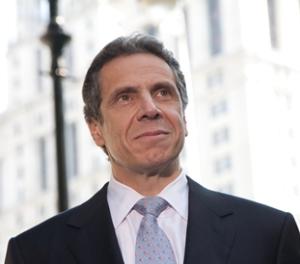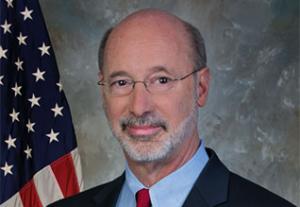Advice to politicians: "If you're against cannabis, the best thing to do is shut up about it. Nobody is with you."
Is this the beginning of the end of marijuana prohibition in the Garden State?
It's just issued a report that provides the answers.
Police officers have discretion. It's a shame this one didn't use it.
This is what Mexico is up against, and helps explain why the countryâs incoming president wants to go in a different direction.
Show Me State voters will vote on three different medical marijuana initiatives, Oklahoma finally gets some livable temporary medical marijuana rules, and more.
A small-town Ohio police chief ODs on drugs he stole from his own department, a veteran Baltimore cop gets nailed for peddling pills, a TSA worker goes down for participating in a cocaine conspiracy, and more.
New York's governor gets behind marijuana legalization, the National Conference of State Legislatures wants Congress to fix the legal pot industry's banking problems, and more.
Oregon's US Attorney fires a warning shot over pot, three different Missouri medical marijuana initiatives qualify for the November ballot, a House panel wants answers on opioids from three big pharmaceutical companies, and more.
New Jersey's assembly speaker gets behind marijuana legalization, Ted Cruz attacks Beto O'Rourke as a drug legalizer, record-breaking British drug deaths spark a critique of government drug policy, and more.
The Oklahoma marijuana legalization initiative has far fewer signatures than organizers claimed last week, marijuana is seeping into congressional and senatorial campaigns, and more.
The Northern Marianas Islands could be the first US territory to legalize weed, a North Dakota legalization initiative looks like it will probably make the ballot, Colombia's new president vows to resort to old prohibitionist drug war policies, and more.
The FDA has issued new draft guidance aimed at expanding the use of medication-assisted treatments (MATs) for opioid addiction, Pennsylvania's governor says the state isn't ready for legal weed, the Oklahoma medical marijuana fight isn't over yet, and more.
Last week, the San Jose Convention Center hosted the National Cannabis Industry Association's (NCIA) 2018 Cannabis Business Summit and Expo. More than 7,000 marijuana industry players and hopefuls crammed into exhibition halls and conference rooms for the three-day confab, located squarely in the heart of the world's largest legal marijuana market -- California.
The variety of stuff on display was mind-boggling: Armored cars, safes, "California compliant" marijuana delivery vans, multi-thousand-dollar extraction devices of gleaming metal and shining glass, lighting systems, cooling systems, myriad forms of packaging, business management systems, POS systems, cannabis industry talent headhunters, greenhouses, modular grow fixtures, insurance companies, law firms, real estate firms -- vegan CBD gummies -- and much, much more. And while a few tie-dyes could be spotted in the crowds, they were few and far between.
While for most attendees the expo was all about business, the legal marijuana business still has to ponder the specter of federal marijuana prohibition actually being enforced. And even at the state level -- where the industry can make money -- it is still constrained by the annoying fact that adult use marijuana is only legal in nine states and the District of Columbia. One panel of experienced marijuana watchers zoomed in on the politics of pot law reform to try to divine what the near future holds -- not so much for the industry, but in terms of consolidating the political victories that have already seen marijuana move from the back alleys to, well, shiny big city convention centers.
The discussion among panelists NCIA director of governmental relations Mike Correia; Jolene Forman, staff attorney for the Drug Policy Alliance; and John Hudak, deputy director of the Center for Effective Public Management and a senior fellow in governance studies at the Brookings Institute, covered a variety of topics and sketched the outlines of what pot politics could look like and achieve between now and the 2020 elections.
Federal Legislation
DPA attorney Forman pointed to three pieces of federal marijuana legislation:
- The Strengthening the Tenth Amendment Through Entrusting States (STATES) Act, S. 3032, sponsored by Sen. Elizabeth Warren (D-MA) with five Republican and four Democratic cosponsors. The bill would modify the Controlled Substances Act so that it would not apply to people acting in compliance with state laws in states where it is legal.
- The Marijuana Freedom and Opportunity Act, S. 3174, sponsored by Senate Minority Leader Chuck Schumer (D-NY). The bill would federally decriminalize marijuana by removing it from Schedule I of the Controlled Substances Act.
- The Marijuana Justice Act, S. 1689, sponsored by Sen. Cory Booker (D-NJ) and cosponsored by a virtual who's who of Democratic 2020 presidential contenders, including Sens. Kirsten Gillibrand (D-NY), Kamala Harris (D-CA), Bernie Sanders (I-VT), and Elizabeth Warren (D-MA). It would remove marijuana from Schedule I of the Controlled Substance Act and eliminate federal criminal penalties for marijuana commerce.
While both the Schumer bill and the Booker bill would decriminalize marijuana, the STATES Act, which would only apply in places it's already legal, is more likely to gain traction, said Forman, a position seconded by Correia.
"The STATES Act is most likely to move," said Correia, who spends his days haunting the corridors of power on Capitol Hill as he lobbies for the industry. "Congress is incremental."
Movement could come faster if Democrats take the House or Senate, he said. "Maybe the Democrats will be more aggressive," Correia suggested, drawing a comparison with movement on gay and lesbian issues in recent years.
Not so fast, said Hudak, noting that key congressional committee chairs have bottled up marijuana bills so far. "Until both parties stop putting in foes of reform in leadership positions, there will be no progress," he said. "And it's not just the GOP." (Until a few months ago he might have been referring to Sen. Dianne Feinstein, who represents the world's largest legal pot market but who only dropped her opposition to legalization last May in the face of a primary challenge and is only beginning to shed last century's prohibitionist ideology.)
There is no reason for Democrats to put enemies of reform in leadership positions, Hudak said. "Cannabis is already a Democratic core value."
"Marijuana legalization could pass Congress right now," Correia argued, "but it doesn't get any hearings; it doesn't get any votes."
If Congress Fails to Act
DPA's Forman explained that while it is now clear that states have the right to not criminalize marijuana and not enforce federal prohibition, a hostile Justice Department could still potentially wreak havoc.
"What is untested in the courts is whether federal preemption could block regulation," she said. In other words, it's possible that the Justice Department could blow up states' ability to tax and regulate the industry.
Forman noted that medical marijuana states are currently protected from Justice Department interference by the repeated passage of amendments to spending bills blocking the DOJ from using its funds to go after medical marijuana where it is legal.
"We need the same for adult use," she said.
Without legislation protecting marijuana, "the executive branch can do things, it could be more aggressive," said Hudak. But he added that doing so would have a price. "That could affect the department's working relationship with the states," he warned.
Correia thought Justice Department meddling was unlikely, despite Jeff Sessions' druthers. "It makes zero sense politically to interfere," he argued, pointing to marijuana's popularity in opinion polls.
Hudak pointed out a possible flip side to a hostile executive power. "A reform-minded president could do a lot," he said, perhaps thinking of the Obama administration's Cole memo laying out how federal prosecutors would lay off legal marijuana in the states. Despite Sessions having nullified the Cole memo, it still seems to be largely the approach of the land.
The 2018 Midterms
"This is an exciting year for cannabis policy politics," said Hudak, pointing to the example of Texas, where progressive Democratic challenger and legalization advocate Rep. Beto O'Rourke is closing in on incumbent Sen. Ted Cruz (R).
"Beto is getting close to Cruz, and the whole time, he's screaming about his support for cannabis reform. That's transformational," he said. "Politicians lag behind; they've been terrified of this issue. Now it's politically beneficial. If you're against cannabis, the best thing to do is shut up about it. Nobody is with you."
It's still an uphill battle in Texas, though. Cruz is leading O'Rourke by 8.4 points in the Real Clear Politics average of polls. But that's only half as much as Cruz's 16-point victory in his 2012 Senate race, and O'Rourke has three more months to move up. And just today, a new Texas Lyceum poll had Cruz leading only 41% to 39%, well within the poll's margin of error.
According to Correia, trying to work with Republicans on Capitol Hill has led to lessons learned: "We see no point in trying to work with the GOP any longer," he said. "We'll be giving money to challengers in competitive races. The Democrats are thinking about this; they will run on marijuana."
The 2020 Election
It looks like marijuana is going to be a popular issue in 2020 -- or at least the people thinking about running for the Democratic presidential nomination seem to think so.
"Potential Democratic candidates are getting their names on big pot bills," Forman noted.
Marijuana is also likely to be on state ballots in 2020, and that will be good for Democrats, said Hudak.
"There will be more initiatives, and those drive Democratic turnout," he argued. "In 2012, Democrats in Colorado voted for cannabis -- and for president, too. Democratic politicians are seeing this."
But Correia said the current president could be a wild card here (as in so many other places): "Trump might just decide to steal the issue, to take it off the table."
Given that Trump has signaled support for the STATES Act, and given Trump's willingness to adopt any position if he thinks it brings him political gain, that's not impossible. And it would take some immeasurable oomph out of Democratic sails.
The Next States to Legalize
Michigan will vote on a legalization initiative in November, and there will be efforts in Arizona and Ohio in 2020, the panelists said. But grassroots initiatives could also bubble up in places like North Dakota and Oklahoma, both of which saw serious efforts this year that will almost certainly not make the November ballot but do lay the groundwork for the next cycle.
Vermont became the first state to free the weed via the legislative process (although it does not allow retail sales), but Correia sketched out how the next couple of years could see Connecticut, Delaware, Illinois, Maryland, New Jersey, New York, and Rhode Island fall in line behind it. By the time November 2020 rolls around, most of New England and the mid-Atlantic states could be legal, with Illinois and Michigan creating a major toehold in the heart of the Midwest.
When it comes to marijuana policy and ending pot prohibition, it looks to be a very interesting and fruitful next couple of years.
(This article was prepared by StoptheDrugWar.org's 501(c)(4) lobbying nonprofit, the Drug Reform Coordination Network, which also pays the cost of maintaining this web site. DRCNet Foundation takes no positions on candidates for public office, in compliance with section 501(c)(3) of the Internal Revenue Code, and does not pay for reporting that could be interpreted or misinterpreted as doing so.)
back to top
State Attorney General Gurbir Grewal has shaken up New Jersey's marijuana politics with an announcement Tuesday that he has ordered county and municipal prosecutors to defer all marijuana-related cases until early September. The move was an unexpected response to a squabble over whether a city in the state could decriminalize pot possession on its own.
Last week, Jersey City Mayor Steven Fulop moved to unilaterally decriminalize small-time pot possession in his city. State Attorney General Gurbir
Grewal told him he couldn't do that.
In a letter last Friday, Grewal declared that his office "takes no position" on marijuana legalization or decriminalization, by warned Fulop he was exceeding his authority."I write to advise that, as a municipal prosecutor, you do not have the legal authority to decriminalize marijuana or otherwise refuse to criminally prosecute all marijuana-related offenses in the municipal courts of Jersey City," Grewal wrote. "Accordingly, I am instructing you that your memorandum is void and has no effect."
But by Monday, Grewal was singing a different tune -- one that will affect thousands of people currently facing marijuana charges in the state. According to Politico, Grewal met with Jersey City officials that day and then agreed to create a working group to set a statewide policy for prosecutors by the end of August. Both the Jersey City prosecutor and the Hudson County (home of Jersey City) prosecutor will be part of the group.
"In the interim, I ask that all municipal prosecutors in New Jersey seek an adjournment until September 4, 2018, or later, of any matter involving a marijuana-related offense pending in municipal court," Grewal wrote in a letter to prosecutors. "This adjournment will give my office sufficient time to develop appropriate guidance for prosecutors."
The move comes as the legislature, with the encouragement of Gov. Phil Murphy (D), ponders a pair of legalization bills, S 2702 and S 2703, filed by Senate President Steve Sweeney (D-Gloucester) and Senate Judiciary Committee Chairman Nicholas Scutari (D-Cumberland). On Monday, Sweeney announced he would combine the bills, tying legalization to an expansion of the state's medical marijuana program.
Murphy had vowed to legalize marijuana within 100 days of his January inauguration, but that hasn't happened yet. That's due in part to opposition from the likes of state Sen. Ronald Rice (D-Essex), head of the Legislative Black Caucus, who favors decriminalization over legalization, and who just last week was warning that legalization could lead to "sex toys and oils with marijuana," among other horrible consequences.
On Tuesday, Gov. Murphy reiterated that decriminalization wasn't enough. "On the surface, [decriminalization] is intoxicating," Murphy told reporters at a joint appearance with Sweeney. "You think it's a step in the right direction but it actually leaves the business in the hands of the bad guys. Your kids are exposed, it's not regulated, it's not taxed. So I'll leave the specifics of that to the attorney general, but that's a conceptual answer."
Legalization is "the bigger lift," Murphy said. "The Senate president is leading that. I'm all in. I think the Assembly speaker... is all in."
Whether the governor and the legislative leadership can get it done this year remains to be seen. And so does whether the era of prosecuting people for pot in New Jersey is over once and for all, and not just for the next couple of months.
This article was produced by Drug Reporter, a project of the Independent Media Institute.
back to top
Acknowledging that his previous opposition to marijuana legalization was being undercut by popular opinion and the spread of legalization in nearby states such as Maine, Massachusetts, and Vermont, New York Gov. Andrew Cuomo (D) in January called for an assessment of the possible impact of legalizing the herb in the state. The state Health Department was charged with the task.

It reviewed the possible health, public health, public safety, criminal justice, economic, and educational impacts of shifting from pot prohibition to a system allowing for the legal, regulated production, distribution, and use of marijuana. To do so, the department examined the experience of legalization in other states as well as conducted an extensive analysis of peer-reviewed literature on the subject. It also consulted with other state agencies and experts in the fields of public health, mental health, substance use disorders, public safety, transportation, and economics to help come up with a comprehensive review.
Last week, the Health Department released itsreport. Here is its bottom line:
"The positive effects of a regulated marijuana market in NYS outweigh the potential negative impacts. Areas that may be a cause for concern can be mitigated with regulation and proper use of public education that is tailored to address key populations. Incorporating proper metrics and indicators will ensure rigorous and ongoing evaluation."
In other words: Just legalize it.
So, how did the Health Department support this conclusion? The report's executive summary lays out its findings in the realms of health, the criminal justice system, economic impact, and the impact of legalization in nearby states. (Click on the summary for a full explanation of the logic behind the bullet points below.)
Health
Regulating marijuana reduces risk and improves quality control and consumer protection.
Marijuana may reduce opioid deaths and opioid prescribing.
Marijuana has intrinsic health benefits and risks.
Marijuana can have effects on mental health.
Regulation leads to little or no increase in adult use, and there is little evidence that regulation leads to an increase in use by youth.
Regulating marijuana may lead to a reduction in the use of synthetic cannabinoids/novel psychoactive substances.
Criminal Justice
Marijuana prohibition results in disproportionate criminalization of racial and ethnic minority groups.
Incarceration has a negative impact on families and communities.
Research is varied on the impact of regulated marijuana on motor vehicle traffic crashes.
Economics
Regulating marijuana will create jobs.
Market size and potential State revenues. The department estimated annual state marijuana sales revenues at between $1.7 billion and $3.5 billion, with estimated state and local tax revenues at somewhere between $248 million and $677 million, depending on sales and tax rates.
Marijuana regulation could generate long-term cost savings.
Impact of Legalization in Surrounding Jurisdictions
Consumers are likely to cross borders to obtain marijuana, committing a federal felony in the process.
Legalization of marijuana causes a sharp increase in marijuana possession arrests in border counties of neighboring states.
Legalization in neighboring jurisdictions raises the likelihood of revenue flowing from New York into those jurisdictions.
In its conclusion, the report called for harm reduction principles to be an integral part of legalization and pointed out that legalization would allow regulation (which prohibition prevents) for "quality control and consumer protection." It also emphasized that tax revenues could "support community reinvestment" and that legalization would "reduce disproportionate criminalization and incarceration of racial and ethnic minority communities."
That last point is a fundamental justice issue. As the report notes, in the past 20 years, more than 800,000 people have been arrested just for pot possession in the state, the vast majority of them young people of color.
The Drug Policy Alliance (DPA), which has been advocating for marijuana legalization in the state (and elsewhere) for years, pronounced itself pleased with the report's conclusions and urged Albany to get moving. A legalization bill, theMarihuana Regulation and Taxation Act (S.3040), is currently under consideration by the legislature and should be acted on, the group said.
"We are pleased that the governor and the State Department of Health have fully studied the existing evidence and accurately concluded that legalizing marijuana for adult use is the right choice for New York. Marijuana prohibition has devastated our communities, saddled hundreds of thousands with criminal records, acted as an easily accessible tool for racially biased policing, and stunted the opportunities for entire generations of mostly New Yorkers of color," said DPA policy coordinator Chris Alexander.
"Now that the report has been released and its conclusions presented, we are hopeful that the Governor and the Legislature can fully shift to examining the 'how' and move on from the 'if.' Any movement to legalize marijuana must also include broad record clearing provisions, must create a diverse and inclusive industry, and guarantee significant community reinvestment to repair the harm that has been done. We look forward to engaging with the governor's office and the legislature on the ways to best move New York forward."
Will Albany act to make New York the next state to free the weed? It wouldn't take an act of political courage: Some 62 percent of New Yorkers support making marijuana use legal for adults over 21, and more than 60 percent support taxing and regulating marijuana as a way to address the state's looming budget deficit.
This article was produced by Drug Reporter, a project of the Independent Media Institute.
back to top
A Clare County, Michigan, sheriff's deputy arrested an 80-year-old grandmother for small-time medical marijuana possession after going to her home on an unrelated matter and smelling it. The grandma, Delores Saltzman, is a patient whose card had expired. She spent a night in jail and had to deal with a court case because the deputy's zero-tolerance approach to marijuana precluded a sensible resolution to the matter.
As local TV station Fox 17 reported, on the evening of June 13, Deputy Ashley Gruno knocked on Saltzman's door. She was trying to find Saltzman's granddaughter to return a lost phone and ID. Things went haywire when Deputy Gruno smelled marijuana from the front porch.
The deputy asked who the marijuana belonged to, and Saltzman explained it was hers and that she was a medical marijuana patient. Deputy Gruno then searched the house, seizing several pipes, four joints, and a purple jar with a small amount of marijuana. Saltzman said the total amount of marijuana seized was less than an eighth of an ounce.
Deputy Gruno then handcuffed Saltzman, place her in a patrol car, and took her to jail, where the arthritic grandmother spent a long night.
"That''s ridiculous what they do to people, they don't need to make you that cold," she said. "Old Arthur was screaming at me" -- a reference to arthritis, her son Mark clarified. Saltzman also suffers from diverticulitis and muscle and bone aches.
Saltzman and her son credit marijuana with saving her life. It helped her appetite when she was sick, helped her heal after surgeries, and eases her pain from health conditions, they said.
"After I smoke, I go down to a one, pain-wise," she said. "Before I smoke, I would say I'm an eight right now. Marijuana saved my life because I had a bad bleed about four years ago, and Mark took care of me," she explained, adding that when doctors prescribed her opioids, she suffered stomach pains and vomiting.
Saltzman said she went public with her story in the hope it will help others. "That's what I want people to do: Don't be ashamed of something that's going to make you feel better."
The deputy was overzealous, said Mark Saltzman. "I just thought it was absolutely ridiculous to put her through this like that. They could have just given her a ticket, and [said] just show us your card later. Reapply for your [medical marijuana] card, show us this, and then drop the charges."
Clare County Prosecutor Michelle Ambrozaitis largely agreed with Saltzman. While she said a possession of marijuana charge was justified because of the expired card, she added: "However, our goal is to ensure that individuals who utilize medical marijuana are doing so legally. As such, Mrs. Saltzman was encouraged to obtain her medical marijuana card and if she did so, the case would be dismissed. She did obtain her medical marijuana card, and the case was dismissed."
Clare County Sheriff John Wilson didn't comment on whether his deputy should have arrested Saltzman and said he agreed with the prosecutor's decision to dismiss the case after she renewed her medical marijuana card, but stuck to his guns on Saltzman's criminality: "This person was illegally in possession of marijuana," he said.
Michigan will vote on legalizing marijuana in November. If advocates had managed to get it on the ballot in 2016, Saltzman and others like her would not have been subject to arrest. She is calling on her fellow Michiganders to vote to legalize it.
"I'm hoping that we all learn a lesson from this and that we make amends, and people will get out and vote for it," Saltzman said. "We are the ones that have to stand up. We are the people, and we just have to fight for our rights."
One can hope that most Michigan police officers and even Deputy Gruno now would be more discriminating than this. But they might not. Until the people do fight -- and win -- Michigan will see more pointless arrests under the prohibition laws.
Watch Saltzman tell her story here:
This article was produced by Drug Reporter, a project of the Independent Media Institute.
back to top
In what looks to be a clear cartel show of force, a video circulating this past week on Mexican social media shows a convoy of dozens of vehicles and scores of uniformed and heavily-armed men stopped on a mountain highway in the state of Jalisco. They appear totally unconcerned about presenting an armed challenge to the Mexican state, and with good reason -- there is no sign of a police or military presence anywhere.
The video, which first popped up on messaging services such as WhatsApp before being picked up by Mexican news web sites, appears to show members of what is now arguably the most powerful drug cartel in the county, the CJNG (Jalisco New Generation Cartel). The CJNG first formed in 2009, but has risen to preeminence in the country's bloody cartel landscape in the wake of the capture and extradition to the United States of Joaquin "El Chapo" Guzman, head of the long-running Sinaloa Cartel, which has since splintered in his absence.
In the video, the suspected cartel member who filmed the footage and a companion talk about the cartel and show other men wearing shirts bearing the CJNG initials. The scores of gunmen, many wearing military-style uniforms and helmets, others wearing pasamontañas (balaclavas), are relaxed and jovial as they casually stroll along the federal highway. Accordion-tinged music blares from car radios.
"Cartel Jalisco," one masked gunman says, pointing to himself. "We're just here on patrol," says another. The videographer describes one group of five men as "los guapos del cartel" (the good-looking guys of the cartel).
The release of the video came just days after federal officials announced they had arrested a local CJNG leader in the disappearance of three Italian citizens in January, leaving some to speculate that the video was a response to the state's actions and was intended to demonstrate the group's power.
The CJNG now controls large chunks of western and central Mexico, especially mountainous regions like the Sierra de Nayarit, where the video was allegedly filmed. It is currently engaged in turf wars with rival drug factions in several states and announced just last week that it is going after la plaza (the franchise -- control of the local drug trade) in the state of Morelos.
Beyond the day-to-day brutality of its involvement in the country's drug wars, which left a record 29,000 dead last year and more than 200,000 dead since the federal government deployed the military against the cartels to bring peace and security in 2006, the CJNG is also responsible for notorious acts of violence this year, including the kidnapping, torture, and murder of three Guadalajara film students and the attempted assassination of Jalisco Labor Secretary Luis Carlos Najera.
Responding to the video, Jalisco Interior Secretary Roberto Lopez Lara said authorities were attempting to authenticate it, but moved to reassure residents. "The state has the security of all residents of Jalisco under control," he said.
The video tells a different story. It's a story all too familiar to Mexicans, who have by now endured more than a decade of drug prohibition-related violence, corruption, and impunity. That's why President-elect Andrés Manuel López Obrador is talking about doing something entirely different: ending the drug war.
Here's the video:
back to top
Show Me State voters will vote on three different medical marijuana initiatives, Oklahoma finally gets some livable temporary medical marijuana rules, and more.
Illinois
Illinois Governor Signs Bill Allowing Medical Marijuana Administration in Schools. Gov. Bruce Rauner (R) has signed into law a bill that requires public schools to allow the parents of sick children to administer medical marijuana to them at school. The law allows parents to administer "cannabis-infused products" if both the child and the parents have been approved under the state's medical marijuana law.
Missouri
Missouri Will Vote on Not One, Not Two, But Three Medical Marijuana Initiatives. The secretary of state's office last Thursday certified three different medical marijuana initiatives for the November ballot. There is a constitutional amendment from New Approach Missouri, as well as a constitutional amendment from Find the Cures and an easier to amend statutory initiative from Lowell Pearson, a Jefferson City attorney.
Ohio
Ohio Awards First Medical Marijuana Processing Licenses. The state Department of Commerce last Friday issued seven provisional licenses to aspiring medical marijuana processors. This is just the first round of licensing for processors; the state could license up to 40 such operations.
Oklahoma
Oklahoma Health Board Approves New Medical Marijuana Rules. The Board of Health last Wednesday adopted new rules to govern the state's medical marijuana system. The new rules amend or totally revoke the original proposed rules, which included a ban on the sale of smokeable marijuana, a requirement that a pharmacist be present at dispensaries, and a requirement that women of childbearing age take a pregnancy test before using medical marijuana. Also gone are guidelines that limited THC levels.
Oklahoma Governor Signs Revised Emergency Rules for Medical Marijuana. Gov. Mary Fallin (R) on Monday signed a revised set of emergency regulations to govern medical marijuana use in the state. The first attempt at emergency rules blew up in Fallin's and the state Health Department's face, being widely criticized for provisions banning the sale of medical marijuana, requiring a pharmacist to be present in dispensaries, and requiring that women "of child-bearing age" undergo a pregnancy test. None of those provisions remain in the new rules, which Fallin called "very basic" and a good basis for developing a comprehensive regulatory regime.
Pennsylvania
Pennsylvania Dispensaries Now Offering Buds. For the first time since state-legal medical marijuana dispensaries opened their doors in the state, patients can buy dried flowers from plants grown under the legal system. At least 16 dispensaries in the state were offering buds as of last Wednesday, with more certain to follow as harvest season looms. But under state law, the buds cannot be smoked -- only vaped.
[For extensive information about the medical marijuana debate, presented in a neutral format, visit MedicalMarijuana.ProCon.org.]
back to top
A small-town Ohio police chief ODs on drugs he stole from his own department, a veteran Baltimore cop gets nailed for peddling pills, a TSA worker goes down for participating in a cocaine conspiracy, and more. Let's get to it:
In Kirkersville, Ohio,
the cause of death for the Kirkersville police chief was announced on Monday. Chief James Hughes Jr., 35, died of "acute fentanyl intoxication" after using drugs he stole from his department's evidence room. Police searching his home found packages of heroin, fentanyl, and LSD strewn about his living around, as well as three syringes, one containing traces of a powerful opioid, and another containing fentanyl.
In Oklahoma City, a now-former Cleveland Police volunteer reserve officer was arrested July 27 after being caught with nearly 160 pounds of marijuana. Terry Browne, 33, was fired immediately after being arrested. He now faces drug trafficking charges.
In Baltimore, a Baltimore police officer was arrested last Wednesday on drug trafficking charges after Baltimore County police officers observed him making a drug deal in a suburban parking lot. Officer Spencer Moore, a 14-year veteran of the department, and another man were detained, and police found three pill bottles containing over a hundred oxycodone pills in Moore's car. He is charged with possession with the intent to distribute a narcotic, possession of a controlled dangerous substance, and obtaining a prescription by fraud. He is being held without bail at the Baltimore County Department of Corrections.
In Baker, Louisiana, a now-former probation officer was convicted last Thursday of taking money to rig a city worker's drug test. Peron McCastle, 56, went down after he was recorded telling the worker the test had come back positive, but he had reported it as negative. He then demanded an unspecified sum of money from the worker. He was convicted of public bribery and is looking at up to five years in state prison.
In Pueblo, Colorado, a now-former state prison guard was sentenced last Wednesday to 60 days in jail for smuggling methamphetamine to a prisoner with whom she was romantically involved. Sarah James, 25, had pleaded guilty last month to a misdemeanor count of possession of contraband. She went down after she was caught coming to work with two packages of meth and a love letter to the inmate in her lunchbox. She admitted to being paid $2,000 on each of three occasions she had smuggled drugs into the jail.
In Charlotte, North Carolina, a former Transportation Security Administration (TSA) officer was sentenced Tuesday to 25 years in federal prison for participating in a cocaine trafficking conspiracy that introduced large quantities of the drug into North Carolina cities. Jamie Blunder, 50, was convicted of drug trafficking conspiracy and firearms charges. Blunder wasn't accused of trafficking drugs at his airport job, but he did use his TSA position to avoid police detection while traveling.
back to top
New York's governor gets behind marijuana legalization, the National Conference of State Legislatures wants Congress to fix the legal pot industry's banking problems, and more.

New York Gov. Andrew Cuomo (D) gets on board with marijuana legalization. (Pat Arnow/Creative Commons)
State Legislatures Ask Congress to Help Marijuana Businesses Access Financial Services. The National Council of State Legislatures approved a directive Wednesday calling on Congress to help legal marijuana businesses gain access to banking and financial services. The policy directive will help guide the council's lobbying activities in Washington.
New York Governor Endorses Marijuana Legalization, Forms Working Group. Gov. Andrew Cuomo (D) announced Thursday that he has formed a working group to draft legislation to legalize marijuana. Cuomo said he hoped the legislature would consider a legalization bill in the next session. The legislation will be based on the findings of a multi-agency study headed by the state Health Department that was released last month. "As we work to implement the report's recommendations through legislation, we must consider all aspects of a regulated marijuana program, including its impact on public health, criminal justice, and state revenue, and mitigate any risks associated with it," he said.
Medical Marijuana
Pennsylvania Dispensaries Now Offering Buds. For the first time since state-legal medical marijuana dispensaries opened their doors in the state, patients can buy dried flowers from plants grown under the legal system. At least 16 dispensaries in the state were offering buds as of Wednesday, with more certain to follow as harvest season looms. But under state law, the buds cannot be smoked -- only vaped.
back to top
Oregon's US Attorney fires a warning shot over pot, three different Missouri medical marijuana initiatives qualify for the November ballot, a House panel wants answers on opioids from three big pharmaceutical companies, and more.

Show Me State voters will be voting on three separate medical marijuana initiatives in November. (Creative Commons)
Oregon US Attorney Says Marijuana Industry There Is Out of Control. Oregon US Attorney Billy J. Williams fired a warning shot across the bow of the state's pot industry on Thursday. Responding to a High-Intensity Drug Trafficking Area (HIDTA) report this week that accused the state's marijuana growers of overproduction, Williams minced few words: "The recent HIDTA Insight Report on marijuana production, distribution, and consumption in Oregon confirms what we already know -- it is out of control," he said. "The industry's considerable and negative impacts on land use, water, and underage consumption must be addressed immediately. State officials should respond quickly and in a comprehensive manner to address the many concerns raised by this assessment," said Williams. "To date, we've seen insufficient progress from our state officials. We are alarmed by revelations from industry representatives, landowners, and law enforcement partners describing the insufficient and underfunded regulatory and enforcement structure governing both recreational and medical use. A weakly-regulated industry will continue to detract from the livability and health of communities throughout the state."
Medical Marijuana
Illinois Governor Signs Bill Allowing Medical Marijuana Administration in Schools. Gov. Bruce Rauner (R) has signed into law a bill that requires public schools to allow the parents of sick children to administer medical marijuana to them at school. The law allows parents to administer "cannabis-infused products" if both the child and the parents have been approved under the state's medical marijuana law.
Missouri Will Vote on Not One, Not Two, But Three Medical Marijuana Initiatives. The secretary of state's office on Thursday certified three different medical marijuana initiatives for the November ballot. There is a constitutional amendment from New Approach Missouri, as well as a constitutional amendment from Find the Cures and an easier to amend statutory initiative from Lowell Pearson, a Jefferson City attorney.
Oklahoma Health Board Approves New Medical Marijuana Rules. The Board of Health on Wednesday adopted new rules to govern the state's medical marijuana system. The new rules amend or totally revoke the original proposed rules, which included a ban on the sale of smokeable marijuana, a requirement that a pharmacist be present at dispensaries, and a requirement that women of childbearing age take a pregnancy test before using medical marijuana. Also gone are guidelines that limited THC levels.
Heroin and Prescription Opioids
House Panel Presses Drug Companies on Opioid Crisis. The leaders of the House Energy and Commerce Committee have sent letters to three companies that manufacture opioids requesting they appear before the committee to answer questions about how they marketed opioids and whether they ignored evidence of abuse of their products. The companies are Insys Therapeutics, Mallinckrodt Pharmaceuticals, and Purdue Pharma. The letters make no mention of ensuring that chronic pain patients continue to receive adequate supplies of opioids.
back to top
New Jersey's assembly speaker gets behind marijuana legalization, Ted Cruz attacks Beto O'Rourke as a drug legalizer, record-breaking British drug deaths spark a critique of government drug policy, and more.

Fentanyl deaths nearly doubled last year in Great Britain. (Creative Commons)
Key New Jersey Politico Now Supports Marijuana Legalization. Assembly Speaker Chris Coughlin (D-Middlesex), a key player in the legislature, said Friday he supported making the state the next one to legalize marijuana. Both Gov. Phil Murphy (D) and Senate President Stephen Sweeney (D-Gloucester) have both been more enthusiastic about legalization than Coughlin up until now. "For folks who don't want to legalize it, I understand their view. But I would ask, are we satisfied with the status quo," Coughlin said on his regular "Speak to the Speaker" radio program. "Use of marijuana is still a constant. Three out of five drug arrests are for marijuana. African Americans are three times more likely to get arrested for marijuana," Coughlin said. "We're trying to address those things and I think, if you got the right bill, we'll go ahead and try to pass it."
Medical Marijuana
Ohio Awards First Medical Marijuana Processing Licenses. The state Department of Commerce on Friday issued seven provisional licenses to aspiring medical marijuana processors. This is just the first round of licensing for processors; the state could license up to 40 such operations.
Drug Policy
Ted Cruz Attack Ad Slams Beto O'Rourke as Drug Legalizer. With the underdog Democrat nipping at his heels -- a recent poll has the Texas senate race as a statistical dead heat -- incumbent GOP Sen. Ted Cruz is using an ad that accuses O'Rourke of being a drug legalizer. "Beto O'Rourke said we should consider legalizing all narcotics, including heroin," says one ad running in Lubbock. The O'Rouke campaign said that is not true -- that O'Rourke supports marijuana legalization and says we need a larger discussion about ending the war on drugs. The campaign also warned supporters more than a month ago such attacks would be forthcoming. "It is these kinds of mischaracterizations of our positions, preying on the fears and anxieties of our fellow Texans, that they will try to use as they have used in the past," O'Rourke said on June 29.
International
British Drug Deaths at Record High (Again), Fentanyl Toll Doubles. The British government has reported 3,756 drug deaths in 2017, making the year the fifth in a row to see increases in drug deaths. The 2017 figure is the highest since comparable records began in 1993. The most dramatic drug death increases were around fentanyl and its analogs, which nearly doubled in the space of a year.
British Reform Advocates Rip Government Policies over Drug Deaths. "After five years of record or near-record drug-related deaths, the UK Government has nowhere left to hide. They are responsible for vulnerable people dying in droves, because they are blocking, or refusing to fund, measures proven to save lives in other countries," said Martin Powell of the Transform Drug Policy Foundation. "No one has ever died from an overdose in a supervised drug consumption room or heroin prescribing clinic, anywhere. In Portugal -- where drug use is decriminalized -- the drug death rate is less than a tenth of ours. So Government claims that these deaths are all the result of an aging population of drug users is a lie. The Government must fully fund drug treatment, stop criminalizing people who use drugs, and allow supervised drug consumption rooms now. Longer term, all political parties should back legal regulation of the drug market to take it out of the hands of criminals, save lives, reduce crime, and protect our communities." Also commenting was Rose Humphries of the Anyone's Child Project, who lost two sons to heroin overdoses: "It upsets me to see the figures for drug deaths at record levels year after year. The government is complicit in these deaths because it will not try the successful measures that work in other countries to reduce drug deaths and crime. Those of us in the Anyone's Child campaign can see the evidence of what works -- including legally regulating drugs. Why can't the government?" she asked.
(This article was prepared by StoptheDrugWar.org's 501(c)(4) lobbying nonprofit, the Drug Reform Coordination Network, which also pays the cost of maintaining this website. DRCNet Foundation takes no positions on candidates for public office, in compliance with section 501(c)(3) of the Internal Revenue Code, and does not pay for reporting that could be interpreted or misinterpreted as doing so.)
back to top
The Oklahoma marijuana legalization initiative has far fewer signatures than organizers claimed last week, marijuana is seeping into congressional and senatorial campaigns, and more.

Texas Congressman Beto O'Rourke raked in big campaign bucks after Ted Cruz accused him of being a drug legalizer. (Flickr)
Ted Cruz Attack Ads Backfire as Beto O'Rourke Has Huge Fundraising Weekend. Incumbent Sen. Ted Cruz (R) last Friday released a trio of ads attacking Democratic challenger Rep. Beto O'Rourke, including one that claimed O'Rourke said "we should consider legalizing all narcotics, including heroin." O'Rourke supports marijuana legalization and, as an El Paso city council member, called in 2009 for a discussion about ending the drug war, including drug legalization, which is distinct from endorsing drug legalization. In the wake of the Cruz attack ads, though, O'Rourke reported raising $1.2 million over the weekend from some 39,000 grassroots contributions.
Oklahoma Legalization Initiative Looks Less Likely. Last week, Green the Vote, the group behind the State Question 797 legalization initiative, claimed it had more than 132,000 raw signatures -- slightly more than the number of valid voter signatures needed to qualify for the November ballot -- but the group admitted Tuesday morning that the actual raw signature count was actually around 75,000. The deadline for handing in signatures is Wednesday. "I've been working 24 hours a day to bring in those signatures to try to make up for it so that I wouldn't be letting you down, and I understand I have let you down," Green the Vote's Isaac Caviness said. "No matter what -- if we have the signatures, if we don't have the signatures -- I have let you down, and I accept that."
Wisconsin US Rep. Sean Duffy Slams Democratic Opponents Over Marijuana Legalization. Incumbent Rep. Sean Duffy (R-WI) is attempting to use support for marijuana law reform as a cudgel with which to attack his Democratic opponents. Both 7th District Democratic primary contenders, Margaret Engebretson and Brian Ewart, have come out in support of marijuana legalization. When asked about his reaction, Duffy responded thusly: "I'm the father of eight kids and as a former prosecutor and now a congressman, I see what's happening in America with a drug epidemic, from opioids to meth to heroin. I think marijuana is a gateway drug to these other drugs," Duffy said.
Medical Marijuana
Oklahoma Governor Signs Revised Emergency Rules for Medical Marijuana. Gov. Mary Fallin (R) on Monday signed a revised set of emergency regulations to govern medical marijuana use in the state. The first attempt at emergency rules blew up in Fallin's and the state Health Department's face, being widely criticized for provisions banning the sale of medical marijuana, requiring a pharmacist to be present in dispensaries, and requiring that women "of child-bearing age" undergo a pregnancy test. None of those provisions remain in the new rules, which Fallin called "very basic" and a good basis for developing a comprehensive regulatory regime.
(This article was prepared by StoptheDrugWar.org's 501(c)(4) lobbying nonprofit, the Drug Reform Coordination Network, which also pays the cost of maintaining this website. DRCNet Foundation takes no positions on candidates for public office, in compliance with section 501(c)(3) of the Internal Revenue Code, and does not pay for reporting that could be interpreted or misinterpreted as doing so.)
back to top
The Northern Mariana Islands could be the first US territory to legalize weed, a North Dakota legalization initiative looks like it will probably make the ballot, Colombia's new president vows to resort to old prohibitionist drug war policies, and more.

Newly installed Colombian President Ivan Duque vows a drug crackdown. (Flickr)
Marijuana Legalization Bill Passes Northern Mariana Islands House. The Northern Marianas Islands House of Representatives on Wednesday approved a marijuana legalization bill, House Bill 20-178, on an 18-1-1 vote. The bill legalizes the use of marijuana for medicinal purposes, but also for adult use. People can possess up to an ounce and grow a limited number of plants, and the bill creates a regime for legal, regulated, and taxed production and sales. It now goes before the territory's Senate. If it passes, the Northern Marianas would be the first US territory to legalize marijuana.
North Dakota Legalization Initiative Likely to Make Ballot, State Officials Say. State election officials have told Marijuana Moment that the organizers of a marijuana legalization initiative have very likely come up with enough valid voter signatures to qualify for the November ballot. The group, LegalizeND, submitted about 18,700 raw signatures; it needs 13,452 valid voter signatures to qualify. The elections office is currently finishing the signature verification process and will announce on August 13 whether the measure qualified.
Congressional Bar on DC Regulated Sales Leading to Distribution Arrest Surge, Report Finds. More than 900 people were arrested for marijuana offenses in the nation's capital last year, a jump of 37% over 2016 figures, according to new data from the DC Metro Police. Pot arrests bottomed out at 323 in 2015, the first full year of legalization. Prior to legalization, the vast majority of arrests were for possession, but since then, distribution and possession with intent to distribute account for the majority of pot arrests. Analysts pointed to the congressional bar against the District allowing legal, regulated sales as being behind both the overall jump in arrests and the increasing percentage of sales and possession with intent arrests.
International
Colombia's New President Takes Office, Vows Drug Crackdown. Ivan Duque, a conservative ally of former President Alvaro Uribe, was installed as president Tuesday. He immediately pointed to the expansion of coca production, corruption, and the violence of drug trafficking groups as problems he will address. "The time has come for us to unite to confront all illegalities," including drug trafficking and production, he said. "We will be effective in the eradication and substitution of illegal crops, accompanied by productive opportunities" for farmers and a crackdown on drug traffickers, Duque promised. "Building peace, Colombians, means to defeat the drug cartels," he said.
back to top
The FDA has issued new draft guidance aimed at expanding the use of medication-assisted treatments (MATs) for opioid addiction, Pennsylvania's governor says the state isn't ready for legal weed, the Oklahoma medical marijuana fight isn't over yet, and more.

Pennsylvania Gov. Tom Wolf (D) isn't on the same page as his counterparts in New York and New Jersey. (Creative Commons)
Pennsylvania Governor Says State Not Ready for Marijuana Legalization. Gov. Tom Wolf (D) said during a radio interview on Tuesday that he doesn't think the state is ready to legalize marijuana. "There are, what, six states that have legalized recreational marijuana in the United States," Wolf said. (The actual number is nine.). "I don't think the citizens of Pennsylvania are ready for it, and so the answer I would say is no… I don't think Pennsylvania's actually ready for recreational marijuana." The position puts Wolf at odds with two neighboring Democratic governors, Phil Murphy of New Jersey, who is strongly pushing legalization, and Andrew Cuomo of New York, who just signed off on the notion.
Los Angeles Won't Vote on Raising Pot Tax in November. The city council has reversed a decision to place a 1% marijuana tax increase on the November ballot. The city estimated it would raise approximately $30 million per year from the tax increase, but faced immediate blowback from industry groups who said pot taxes were already too high and are driving consumers to the black market.
Medical Marijuana
Oklahoma Agencies Still Have "Concerns" Over Legal Medical Marijuana. Interim health commissioner Tom Bates told lawmakers Wednesday that the Health Board still has concerns about how medical marijuana will be implemented and that a special session of the legislature may be needed to see the program properly implemented. The board wants lawmakers to amend the law so that, among other changes, commercial grows are indoor only, patient home grows are prohibited or require a special license, smokable marijuana is prohibited, THC levels are limited to 12% or less, a pharmacist is required on-site at dispensaries, and that a list of qualifying conditions for patients be created. Some of the changes are among those recommended in the Health Board's first try at setting interim rules, which were retracted in the face of loud public opposition. Any effort to re-adopt them is certain to lead to renewed clamor.
Heroin and Prescription Opioids
FDA Seeks to Expand Use of Medication-Assisted Therapies for Addiction. The Food & Drug Administration (FDA) on Monday released new draft guidance aimed at promoting the creation and more widespread use of medication-assisted therapies (MATs) for opioid use disorder. The guidance adjusts how FDA evaluates new treatments for opioid addiction. Instead of only determining whether a treatment lowers opioid use, the agency will now assess whether the medication could help lower overdose rates and limit the spread of infectious disease. "We must consider new ways to gauge success beyond simply whether a patient in recovery has stopped using opioids, such as reducing relapse overdoses and infectious disease transmission," said Scott Gottlieb, FDA commissioner.
back to top












